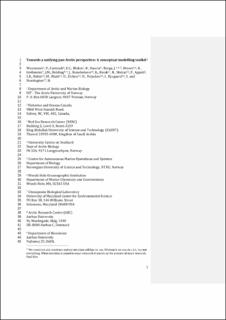Towards a unifying pan-arctic perspective: A conceptual modelling toolkit
Wassmann, Paul; Carmack, E.; Bluhm, Bodil; Duarte, Carlos M.; Berge, Jørgen; Brown, K.; Grebmeier, Jacqueline M.; Holding, Johnna; Kosobokova, Ksenia; Kwok, R.; Matrai, Patricia A.; Agusti, S.; Babin, Marcel; Bhatt, Uma S.; Eicken, Hajo; Polyakov, Igor V.; Rysgaard, Søren; Huntington, Henry P.
Peer reviewed, Journal article
Accepted version

Åpne
Permanent lenke
https://hdl.handle.net/11250/2734778Utgivelsesdato
2020Metadata
Vis full innførselSamlinger
- Institutt for biologi [2566]
- Publikasjoner fra CRIStin - NTNU [37994]
Sammendrag
The Arctic Ocean is overwhelmingly forced by its lateral boundaries, and interacts with, the global system. For the development of nested conceptual models of the Arctic Ocean ecosystem we here choose the full pan-Arctic as our focal scale. Understanding the pan-Arctic scale, however, requires that we look at the underlying scales of its major components, by considering regionality, connectivity and seasonality. Six regions are identified on the basis of hydro-morphological characteristics, which subsequently reflect ecological function and traits. Regions are static, tied to geography, but are linked by contiguous domains of shared function that facilitate material transports and share key ecological features. The pan-Arctic scale also requires attention to forcing by the seasonal light intensity, wherein the maximum length of a single day varies from near 24 h at the Arctic Circle to about 4400 h (183 days) at the North Pole. The light climate forces a strong phenology in the Arctic, as reflected in the periodic life cycle events of organisms. In addition to light climate, Arctic Ocean ecosystems are dominated by three fundamental variables: ice cover, nutrient/food availability and advection. The conditions under which each of these variables play out in the course of a year are set by the regions and contiguous domains within which they operate and interact. Together, the defined regions and their seasonality, the contiguous domains and their connectivity, and the three fundamental variables allow unambiguous application of scale-nested, parsimonious and adaptive, conceptual models, from which to 1) create testable hypotheses, 2) plan and then modify field campaigns, and 3) communicate essential results to managers and the general public. The development of these nested conceptual pan-Arctic scale models creates a vital step into the future of unifying, integrative oceanographic and ecological work.
